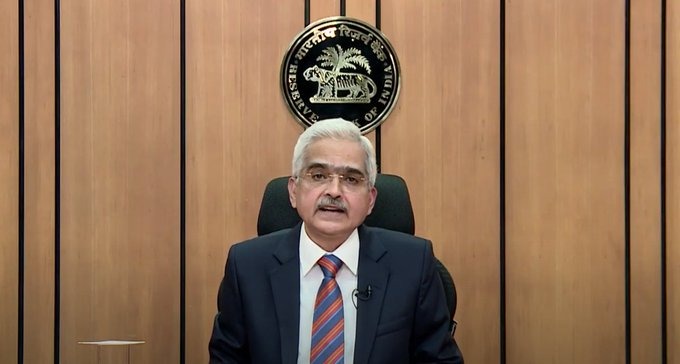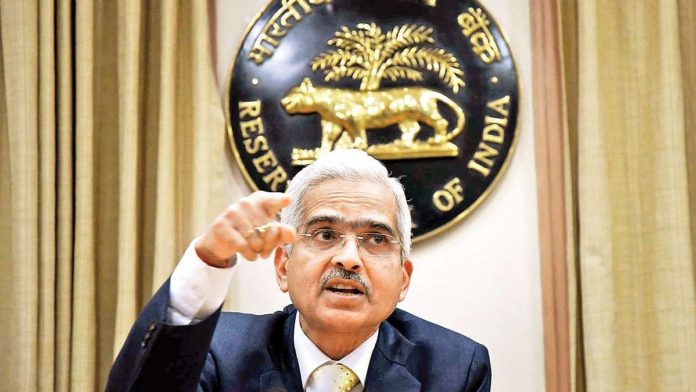The Reserve Bank of India (RBI)’s Monetary Policy Committee (MPC) has voted unanimously to leave policy repo rate unchanged at 4%. At the same time, Marginal Standing Facility and Bank Rate will also remain unchanged at 4.25%, while the Reverse Repo Rate too will remain unchanged at 3.35%. Stating this, the RBI Governor, Shri Shaktikanta Das said, accommodative stance of monetary policy will continue as long as necessary, to revive growth and mitigate impact of COVID-19, while ensuring inflation remains within the target, going forward.

The Governor also announced a set of additional measures with the paramount objective of reviving the economy, to enhance liquidity support, deepen financial markets; conserve capital among banks and NBFCs, strengthen regulatory supervision, facilitate external trade and upgrade payment system services.
1) On Tap Targeted Long Term Repo Operations announced on 9th October will be expanded to cover other stressed sectors in line with Credit Guarantee available under Emergency Credit Line Guarantee Scheme 2.0 of the Government. This will encourage banks to extend credit support to stressed sectors at a lower cost.
2) To expand money market participation of Regional Rural Banks (RRBs) and to facilitate better liquidity management, RRBs will now be permitted to access Liquidity Adjustment Facility and Marginal Standing Facility of RBI and also the call/notice money market.
3) Existing guidelines on Credit Default Swap will be reviewed, to facilitate development of credit derivatives market and a vibrant market for corporate bonds, especially for lower-rated issuers. Draft guidelines to be issued for public comments.
4) 2011 Comprehensive Guidelines on Derivatives have been reviewed and draft directions are being issued today for public comments. Revision seeks to promote efficient access to derivative markets and ensure high standards of conduct in OTC derivative business.
5) Comprehensive draft directions on call, notice and term money markets, Certificate of deposits, commercial papers and non-convertible debentures with original maturity period of less than one year are being released today for public feedback.
The aforesaid five announcements will go a long way in promoting and developing corporate bond market and derivatives markets in India, noted the RBI Governor.
6) Commercial and cooperative banks will retain profits earned in 2019-20 and not make any dividend payouts from the profits pertaining to the financial year 2019-20. This will help banks conserve capital while creating room for fresh lending.
7) Transparent criteria as per a matrix of parameters, for declaration of dividends by different categories of NBFCs will be formulated, to improve resilience of NBFCs. Draft guidelines on this will be released soon.
8) Current regulatory regime for NBFC sector built on principle of proportionality will be reviewed. Scale-based regulatory approach linked to systemic risk contribution of NBFCs could be the way forward. Discussion paper on this will be issued before January 15, 2021.
9) Guidelines to be issued shortly on:
- Introduction of Risk-Based Internal Audit in large UCBs and NBFCs
- Harmonization of guidelines on the appointment of statutory auditors for commercial banks, UCBs and NBFCs to improve the quality of financial reporting.
10) To improve digital payment channel ecosystem with robust security and convenience for users, RBI Digital Payment Security Control Directions for regulated entities will be issued. Draft directions on this will be issued soon.
11) To deepen financial inclusion and financial literacy across the country, the reach of RBI’s Centres for Financial Literacy is going to be expanded from 100 blocks at present to every block in the country by March 2024.
12) Comprehensive Framework for Grievance Redressal Mechanism in banks will be put in place, to enhance efficacy of grievance redressal. This will include enhanced disclosures on customer complaints and monetary disincentives for recovery of cost.
13) To facilitate external trade and enhance export competitiveness, additional powers will be delegated to Authorized Dealer banks, including regularization of cases of direct dispatch of shipping documents & writing off unrealized export bills in some cases.
14) RTGS system will soon made 24/7 in the next few days to reduce settlement and default risk in the system, by facilitating settlement of AEPS, IMPS, NETC, NFS, RuPay, UPI transactions on all days of the week. This will make payment ecosystem more efficient.
15) Limits for contactless card transactions and e-mandates for recurring transactions through cards (and UPI) to be increased from ₹ 2,000 to ₹ 5,000, from January 1, 2021. This will help to expand adoption of digital payments safely and securely.
Speaking about the year 2020 being extremely challenging, the RBI Governor sad that our determination to fight and overcome stood out in this difficult year, and, alongside, the human and economic tragedy, history will also record the unprecedented response by governments, central banks, healthcare systems, personnel and above all the common people. “We have been able to contain human losses, ensure financial systems function normally and reached out to most vulnerable. As a result, near-time financial stability risks have been contained”, he noted. He said that RBI will use various instruments appropriately; calibrating them to ensure ample liquidity is available to the system.
The Governor took note of the following observations made by the MPC:
- Outlook for inflation has turned adverse with respect to expectation. CPI inflation projected at 6.8% for Q3 202021, 5.8% for Q4 2020-21 and 5.2% – 4.6% in H1 of 2021-22
- Real GDP growth for 202021 is projected at -7.5%, for Q3 at 0.1% and for Q4 at 0.7%. H2 of 2020-21 is hence is expected to show positive growth.
- Recovery in rural demand is expected to strengthen further, urban demand too is gaining momentum
- Consumer confidence has turned optimistic; business sentiment of manufacturing firms is gradually improving. Business expectations in Q4 202021 are rising.
In his closing statement, the RBI Governor said, growth impulses that have emerged augur well for the revitalization of the Indian economy. Government and RBI are seeking to nurture and strengthen these by policy stimuli, he added. He concluded saying that India’s time has come to break free of the fetters of COVID-19 and reconfigure our destiny .


